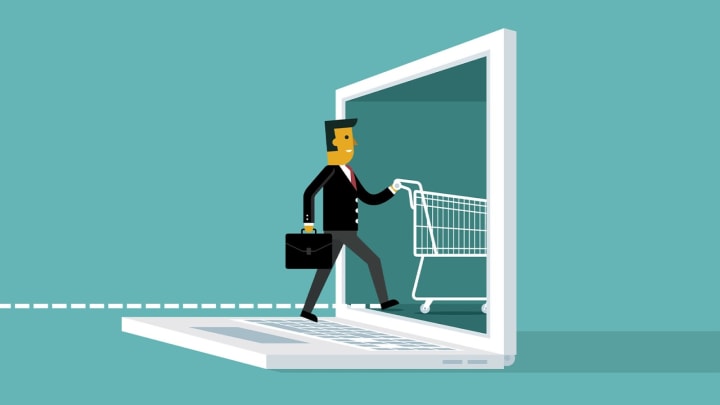Direct-to-Consumer (D2C) – What is It and How It Works?
Get into the world of Direct to Consumer Shopping

The Internet has been one of the most significant factors in how we live our lives during this pandemic. D2C products like direct-to consumer (DTC) goods have increased due to its availability on computer screens and mobile devices, which makes shopping both easier as well as convenient for people who can't go out or work from home because they need access 24/7 . It also made marketplaces accessible with just an internet connection; there was no need whatsoever travel anywhere physically
The Covid virus played a role too - preventing outdoor activities but opening new avenues inside one's house while allowing us more freedom when it comes down to time spent online where many tasks previously required face contact now take place virtually.
What is Direct-to-Consumer?
Direct-to-Customer is a revolutionary new way for brands to market their products without going through the hassle and cost of distribution. For example, before D2C was available in retail stores such as sports goods malls or other places where manufacturers might sell these same football related items directly from the manufacturer's website instead! This means that now players can get what they need at an affordable price while saving time by avoiding long lines outside retailers' shops - all thanks to this cutting edge technology known collectively as "DTC."
The use of apps and online marketplaces has allowed brands to reach their customers in new ways. Direct sales from phones allow for instant gratification without having the need to go through any third party, such as retail stores or websites that require login credentials like Facebook accounts.
The availability D2C (demand-to-charge) model can complement B2B models by providing an experience tailored specifically towards fulfilling customer needs.

Almost all industries, such as mobile phones, computers, clothes, even groceries and automotive have developed direct-to-customer channels. All of these industries prefer to cut off the middlemen or the dealership and deal with the customers directly.
Rise of Direct-to-Consumer
The direct-to-customer market has grown quickly, in fact in double digits for years. It has kept a 19.2% growth in 2021. The most important factor that led to the rise in Direct-to-Customer services is the Internet. When brands saw how much online marketing is preferred over the physical marketplace and when they felt how integrated online shopping is to an individual’s increasingly busy lives, they started investing in the direct-to-customer space.

These data from before the COVID-19 era shows how well the D2C services were accepted by the people at large. Brands like Beavertown Brewery, which was down by 85%, increased their sales to 1000% through D2C. CPG or FMCG brands like Harry's, Allbirds, BarkBox, and Casper have been capturing the market and leaving their competitors who use retail stores far behind by earning annual revenues of millions of dollars through their online business model or D2C model. Seeing this massive success of the D2C channel, major brands like Nike, Adidas, PepsiCo, Apple, Heinz, etc have established direct contact with their consumers, thereby activating the D2C model.
D2C is not going to turn around now. Brands have witnessed how sales have boomed through online shopping and have realized the benefits of building a definite relationship with customers, as it helps majorly in their sales. Along with this, owing to the pandemic and worldwide lockdown, we have witnessed the collapse of retail where thousands of physical stores have shut down since 2019, the number being more than 9300 in the US alone. Thus, considering all the factors, direct-to-consumer services are the new and sustainable future for brands.
The Reasons for the Rise of Direct-to-Consumer
Apart from the complete digitalization of the world due to COVID and physical stores being shut down rapidly, these statistics also mark the rise of D2C.
- Above 50% of the customers want to visit the official brand website due to the trust factor that comes from the official mark. The brand websites also offer a better look at the products that no third-party website will offer.
- 78% of direct-to-consumer brands have raised the budget for marketing, as compared to 60% of traditional retailers. There lies the success of D2C brands.
- It is seen that 40% of customers are expecting that above 40% of their money will go toward D2C brands in the next 5 years, thus showing incentive.
- Instead of buying from retailers who sell numerous products, 55% of customers want to buy from the brand itself.
- It is also witnessed that 61% of customers are more inclined to give information to brands should it provide them with a more improved shopping experience.
- Everyone loves money, and 54% of customers feel they are entitled to a discount or coupon upon contacting the brand for the very first time.
- For at least 22% of customers, same-day delivery is a massive incentive to go for D2C brands.
- For 26% of customers, an enhanced shopping experience and better security during payment are important for the D2C experience.
Advantages of Direct-to-Consumer
There are plenty of benefits to D2C services for both, the brands and the consumers. Such as:

- Good Relationship
It is no secret that a good relationship with consumers is perfect for business as it helps brands retain their consumers and increase their sales. Direct-to-consumer services help in building and maintaining a great relationship between the brands and their consumers. This ensures that the consumers can directly communicate their grievances to the brands and not have to go through any middle man and brands can address those issues right away, thereby building trust.
- Better Profit
By removing the middlemen such as distributors and retailers, brands can eliminate the extra costs that were required for distribution. This will help brands increase their profit margin. Brands can also use this money saved in building relations with their consumer by reducing the cost of their products or giving them discounts.
- Consumers Prefer the Direct Purchase
Consumers will always prefer buying directly from the brand itself instead of any retailer because of the more trustable service. Brands also provide rewards like warranties, lower prices, better deals, and customization that suits the consumer.
- Control
One of the most important factors that influence brands to adopt the direct-to-consumer model is control. Brands can control their prices and not the retailers, they can read the consumer data and address the consumer problems, and they can control their products and its advertisement.
Thus, direct-to-consumer services are gaining popularity by leaps and bounds, and for good reason.
About the Creator
Lily James
I am blessed with a funny gene that makes me enjoy life to the fullest.






Comments
There are no comments for this story
Be the first to respond and start the conversation.